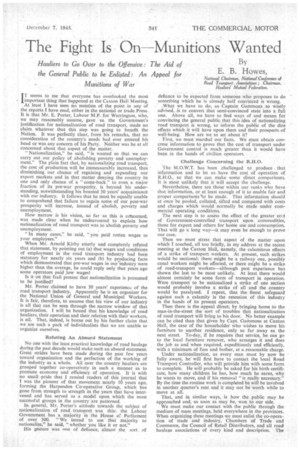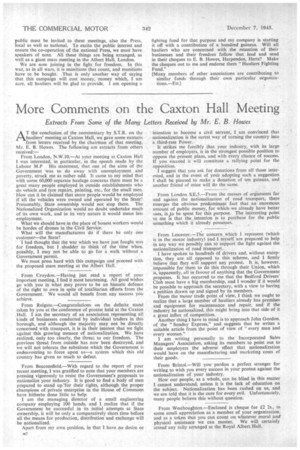The Fight Is On--Munitions Wanted
Page 27

Page 28

If you've noticed an error in this article please click here to report it so we can fix it.
IT seems to me that everyone has overlooked the most 'important thing that happened at the Caxton Hall Meeting. At least I have seen no mention of the point in any of the reports I have read, either in the national or trade_ Press. It is that Mr. E. Porter, Labour M.P. for Warrington, who, we may reasonably assume, gave us the Government's justification for nationalization of road transport, made no
• claim whatever that this step was going to benefit the Nation. It was perfectly Clear, from his remarks, that no consideration of the country's needs had ever entered his head or was any concern of his Party. Neither was he at all concerned about that aspect of the matter.
"Nationalization," he said, "is wanted so that we can carry out our policy of abolishing poverty and unemployment." The plain fact that, by nationalizing road transport, the cost of production will be immeasurably increased, thus diminishing our chance of regaining and expanding our export markets and in that matter denying the country its one and only chance of a "come-back." to even a major fraction of its pre-war prosperity, is beyond his understanding, notwithstanding his boasted 30 years' acquaintance with our industry. It follows that he must be equally unable to comprehend that failure to regain some of our post-war prosperity will increase, instead of abolish, poverty and unemployment.
How narrow is his vision, so far as this is cdhcerned, was made clear when he endeavoured to explain how nationalization of road transport was to abolish poverty and unemployment.
"In many cases," he said, "you paid rotten wages to your employees."
When Mr. Arnold Kirby utterly and completely refuted that statement, by pointing out (a) that wages and conditions of employment in the road transport industry had been statutory for nearly six years and (b) by producing facts which demonstrated that pm-war wages in our industry were higher than the average, he could reply only that years ago some operators paid ,low wages! Is it on that frail pretext that nationalization is presumed to be justified?
Mr. Porter claimed to have 30 years' experience of the road transport industry. Apparently he is an organizer for the National Union of General and Municipal Workers. It is fair, therefore, to assume that his view of our industry is all that can be seen through the narrow window of that organization. I will be bound that his knowledge of road hauliers, their operation and their relation with their workers, is nil. That, indeed, is borne out by his further claim that we are such a pack of individualists that we are unable to organize ourselves.
Refuting An Absurd Statement
No one with the least practical knowledge of road haulage during the past decade would make such an absurd statement. Great strides have been made during the past few years toward organization and the perfection of the working of the industry as a whole. All over the country hauliers are grouped together co-operatively in such a manner as to promote economy and efficiency of operation. It is with no small .pride that I remind readers of this journal that I was the pioneer of that movement nearly 10 years ago, forming the Harpenden Co-operative Group, which has gone from strength to strength in the years that have intervened and has served as a model upon which the most successful groups in the country are patterned.
In general, Mr. Porter's attitude towards the subject of nationalization of road transport was this: the Labour Government has a majority in the House of Parliament of over 300. "We intend to use that majority to nationalize," he said, "whether you like it or not."
His gesture was one of defiance, almost the sort of defiance to be expected from someone who proposes to do something which he is already half convinced is wrong.
What we have to do, as Captain Gammons so wisely advised, is to convert that semi-convinced state into a full one. Above all, we have to find ways of and means for convincing the general public that this idea of nationalizing road transport is wrong, to inform the public of the dire effects which it will have upon them and their prospects,of well-being. How are we to set about it?
First, we must marshal our facts. We must obtain concrete information to prove that the cost of transport under Government control is much greater than it would have been in the hands of civilian operators.
Challenge Concerning the R.H.O.
The M.O.W.T. has been challenged to produce that information and to let us have the cost of operation of R.H.O., so that we can make some direct comparisons. It is most unlikely that it will accept the challenge.
Nevertheless, there are those within our ranks who have that information, or at least enough of it to enable fair and proper comparisons 'to be made. That information should at once be pooled, collated, sifted and compared with costs and charges which would normally be made under commercial operating conditions.
The next step is to assess the effect of the greater cact of Government-controlled transport upon commodities, those for export and others for home use and consumption. That will go a long way—it may _even be enough to prove our case. •
Then we must stress that aspect of the matter upon which I touched, all too briefly, in my address at the recent meeting at the Caxton Hall, namely, the calamitous effects of a strike of transport workers. At present, such strikes
would be sectional: there might be a railway one, possibly canal workers might be affected, or there might be a strike of road-transport workers—although past experience has shown the last to be most unlikely. At least there would almost certainly be some form of transport in operation. Were transport to be nationalized a strike of one section would probably involve a strike of all and the country would be paralysed. I repeat, that the finest safeguard against such a calamity is the retention of this industry in the hands of its present operators.
Then there is the ,appeal direct; by bringing home to the man-in-the-street the sort of troubles that nationalization of road transport will bring to his door. No better example can be cited than that given by Capt. Gammons at Caxton Hall, the case of the householder who wishes to move his furniture to another residence, only so far away as the next street. To-day, if he requires that service, he can go to the local furniture remover, who arranges it and does the job as and when required, expeditiously and efficiently, with a minimum of fuss and bother, at a seasonable charge.
Under nationalization, as every man must by now be fully aware, he' will first have to contact the local Road Transport Controller, who will provide him with some form to complete. He will probably be asked for his birth certificate, how many children he has, how much he earns, why he wants to move, and if his removal "is really necessary." By the time the routine work is completed he will be involved in another quarter's rent and it may not be worth while to move at all.
That, and in similar ways, is how the public may be approached and, as soon as may he, won to our side.
We must make our contact with the public through the medium of mass meetings, held everywhere in the provinces. When organizing these meetings we must enlist the co-operation of trade and industry, Chambers of Trade and Commerce, the Council of Retail Distributors, and all road haulage associations of every kind and description. The
public must be invited to these meetings, also the Press. local as well as national. To excite the public interest and ensure the co-operation of the national Press, we must have speakers of note. All these things are being arranged, as well as a giant mass meeting in the Albert Hall, London.
We are now joining in the fight for freedom. In this war, as in all wars, it is munitions that count, and munitions have to be bought. That is only another way of saying that this campaign will cost money, money which, I am sure, all hauliers will be glad to provide. I am opening a fighting fund for that purpose and my company is starting it off with a contribution of a hundred guineas. Will all hauliers who are concerned with the retention of their businesses and their • freedom follow that lead and send in their cheques to E. B. Howes, Harpenden, Herts? Make the cheques out to me and endorse them "Hauliers Fighting Fund."
[Many members of other associations are contributing to similar funds through their own particular organizations.—ED.1




























































